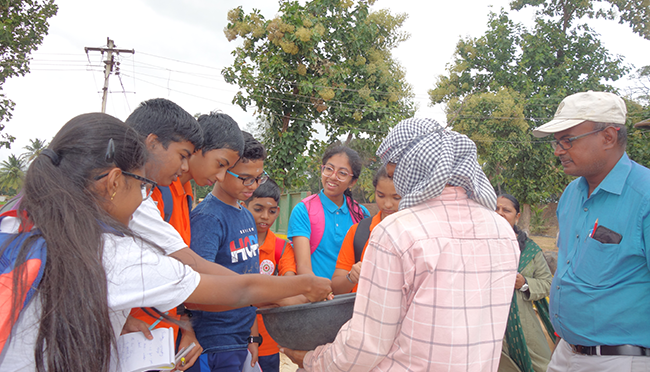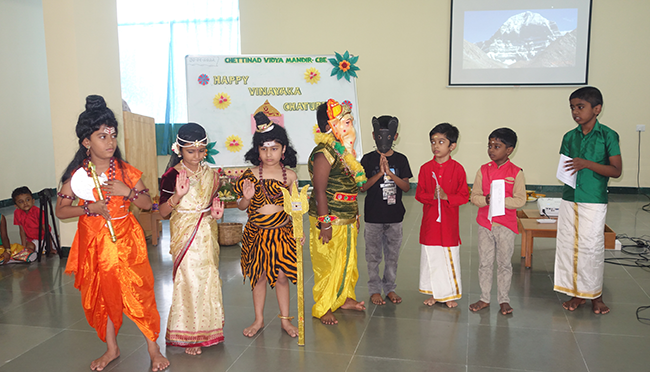The curriculum in the lower secondary years allows learners to widen their horizons and understand their interests deeply. The curriculum is inquiry based and incorporates well-integrated hands-on- activities that help learners connect concepts to real-life experiences. A healthy teacher-student ratio is maintained to ensure a rich and focused classroom experience with better student engagement. The focus is to foster independence and instill confidence in learners as they explore their learning potential at their own pace.
Learners are encouraged to think critically and creatively through interesting projects that help them understand themselves and the world around them.
Subjects offered
English
Science
Mathematics
Global perspectives
Computing
Art and Design
Second and Third languages
Tamil and Hindi/French are continued as the second/ third languages. The importance of mother tongue and connecting to structured writing is focused in the second language as they progress from specific grade levels. Third language promotes oral communication and writing skills which will help them to broaden their view, which serves as an essential part of the multicultural society. French is offered as the third language for learners with Tamil as second language and Tamil is offered as the third language for learners who have Hindi as second language.
Computing
The computing curriculum provides an opportunity for learners to investigate the functioning of systems and networks. Learners are supported to understand how computers can be programmed to control other technology. They also explore how newer and evolving technologies, such as artificial intelligence, are applied to systems used in homes, schools and in a range of service and industrial contexts.




Music: Music helps learners develop a deeper understanding of self-expression, and shows them the importance of communication. The focus is on experimenting and responding to different genres of music.
Learn More about Music at Hari Shree
Art: Through art, learners explore their creativity and learn to compose different paintings. They express their personal talents which are showcased during the events and celebrations.
Learn More about Art at Hari Shree
Dance: Learners are introduced to the theoretical and technical aspects of various Indian dance forms, western and fusion. They get an opportunity to perform the different styles and explore the different cultures globally.
Learn More about Dance at Hari Shree
Physical Education: Physical education is a vital part of a balanced school curriculum.Establishing good patterns of exercise in lower secondary also provides learners with the foundation of an active and healthy lifestyle for life. Learners participate in various organised sports & team games like football, basketball, cricket, badminton, chess and carrom. These help learners to develop team spirit and sportsmanship.
Learn More about Sports at Hari Shree
Field Trips and Outbound Trips: The curriculum provides an extended learning beyond class-rooms across grades where the concept is connected to the real life applications. This experience helps them to gather information and make their own connections by completing extended project activities post their field trips.
Our experienced teachers create a stimulating learning environment motivating our learners to discover and develop their interests to think critically and creatively about the challenges and opportunities before them.
Learn More about Field Trips and Outbound Trips
Guest Lectures: To provide learners with deeper understanding of concepts beyond the curriculum, professionals from varied backgrounds are invited as guest lectures. This provides an opportunity for the learners to have a deeper understanding of the concepts.
Green Education and Wall less learning The vision of our school aims in building responsible global citizens who are mindful of their actions and join hands to conserve our environment. Green education is integrated with our curriculum where learners are provided experiential learning following sustainable practices. In the lower secondary years, the focus is for learners to foster connection to society and wanting to care for the world.
They are given the opportunity to cultivate their own plants and observe the stages of growth, monitor the growth of plants on a regular basis, take care of the plants by removing the weeds, use manure from the school’s compost pit and finally harvest the yield. This journey gives them an experience of farming and the challenges are considered as the learning phase. Learners progress from a consumer mindset to producing the food and learn the importance of farming. This learning can be applied in their real life of turning kitchen waste into nature’s black gold(manure) and conserving water by self-watering techniques and advantages of drip irrigation methods. Learners are given scope to take up projects regarding restoration projects. They carry out campaigns and expeditions in order to spread environmental awareness.They develop in the process their creativity, research skills, problem-solving skills and are encouraged to collaborate amongst their peers.
Wall less practices focus on an education that embraces Ecophilia the love and care towards nature. Our school provides the integration to wall less classes which aims to create the bond between humans and nature. Learners are given the time to connect with nature through various activities like farming, turning bio-degradable wastes into manure, producing bio-enzyme cleaners etc and love the earth, plan for simple research projects by observing the community and then take responsible decisions in saving the environment.
Socio-Emotional Learning Social emotional learning aims to foster social and emotional skills within the curriculum. The integration is done across subjects aligning to the objectives and the focus is given on five main components of SEL as self-awareness, self-management, social awareness, relationship and responsible decision making skills. The skills are developed through various activities during circle time, subject integrations, during celebrations which helps to acquire and apply the knowledge, skills and manage emotions to achieve personal and collective goals.




All images and text @ Copyright Chettinad Hari Shree Vidyalayam, Coimbatore. All Rights Reserved.